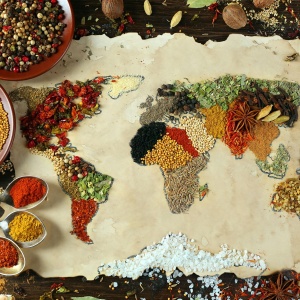
In this brief communication paper published in the first volume of the new journal Nature Sustainability, researchers from the US and Belgium assess the impact of international trade on global food supply, at the level of individual nutrients, rather than total calories. Based on their hypothetical comparison of food supply in a world with and without trade, they argue that international food trade is essential for global food security.
The researchers used FAO, USDA and country-specific nutrition data to assess the current deficiencies or sufficiencies/surpluses of macro- and micronutrients by country. By subtracting from these values the nutrients currently acquired by each country through food imports, and adding the nutrients currently ‘lost’ through exported food, the authors created a highly hypothetical ‘no trade’ scenario for comparison with the current ‘trade’ scenario, enabling them to estimate the impact of international trade on the equitability of nutrient distribution.
The key findings of their data analysis and scenario comparison were:
- The current global food supply (i.e. food available for consumption, after waste, losses etc. are accounted for) would meet the caloric and nutritional requirements of the current world population were it to be perfectly equally distributed.
- There is a large disparity between global nutrient production (i.e. nutrients in crops and livestock before accounting for waste, losses, etc.) and nutrient supply (i.e. amount available for consumption), suggesting crop improvements alone would be insufficient to meet nutritional needs without policies to translate it into increased supply.
- All countries have sufficient protein to meet current nutritional requirements, but many countries are currently unable to meet especially micro-nutritional needs.
- Nutritional distribution between countries was always shown to be less equal under the no-trade scenario (reflecting the very reason for the existence of trade in the first place: very simply, that countries are abundant in different commodities, export their surpluses and import the things in which they are lacking).
- Low income countries in particular benefit from trade with respect to most nutrients except for iron and folate, while high-income countries had a more variable relationship between trade and nutrient potential (i.e. the number of people whose nutritional requirements could be met).
- Depending on which nutrients are considered, and based simply on the comparison of trade and no-trade scenarios, the authors estimate international trade to be responsible for the nourishment of between 146 and 934 million people globally.
Although the authors argue in favour of international trade on the basis of the above findings, and against protectionist policies that would limit it, they acknowledge a number of challenges and limitations with current food trade practices:
- The most easily traded foods, such as grains, are often lowest in composition of the micronutrients that many countries lack.
- Within countries, there is no guarantee that imported nutrients reach those most in need of them.
- Specialisation in the production of certain foods for export, motivated by international trade, can be associated with environmental harm (e.g. palm oil).
- Relying on trade to meet nutritional needs can leave countries vulnerable to sudden changes in global trade patterns.
Although not explicitly stated by the article, it could be concluded that while current international trade ensures the adequate nutrition of many hundreds of millions of people more than if there were no trade, it could be improved to meet them better; the possible means to this are not discussed in the article, and the authors do not offer up specific recommendations.
Abstract
Access to sufficient, nutritious food is a basic human right and is necessary to achieving the United Nations’ Sustainable Development Goals. We demonstrate that international food trade, in the current global system, is essential to nutrient access and enables some poorer countries to be able to nourish up to hundreds of millions of people. Protectionist trade policies could therefore have serious negative consequences for food security.
Reference
Wood, S.A., Smith, M.R., Fanzo, J., Remans, R., and DeFries, R.S. (2018). Trade and the equitability of global food nutrient distribution. Nature Sustainability, 1(1), 34.
Read the full article here.







Post a new comment »